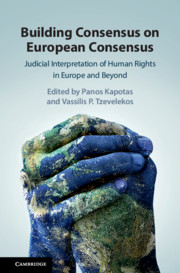 Building Consensus on European Consensus
Building Consensus on European Consensus Book contents
- Building Consensus on European Consensus
- Building Consensus on European Consensus
- Copyright page
- Contents
- Contributors
- Foreword
- Acknowledgements
- 1 How (Difficult Is It) to Build Consensus on (European) Consensus?
- Part I Understanding European Consensus
- Part II Appraising European Consensus
- 9 A Better Signpost, Not a Better Walking Stick: How to Evaluate the European Consensus Doctrine
- 10 Constructive Consensus and Domestic Democracy
- 11 The European Consensus Doctrine and the ECtHR Quest for Public Confidence
- 12 Can European Consensus Encourage Acceptance of the European Convention on Human Rights in the United Kingdom?
- 13 When to Use European Consensus
- 14 When the European Court of Human Rights Decides Not to Decide
- Part III Consensus Analysis Outside the ECHR System
- Index
11 - The European Consensus Doctrine and the ECtHR Quest for Public Confidence
from Part II - Appraising European Consensus
Published online by Cambridge University Press: 04 January 2019
- Building Consensus on European Consensus
- Building Consensus on European Consensus
- Copyright page
- Contents
- Contributors
- Foreword
- Acknowledgements
- 1 How (Difficult Is It) to Build Consensus on (European) Consensus?
- Part I Understanding European Consensus
- Part II Appraising European Consensus
- 9 A Better Signpost, Not a Better Walking Stick: How to Evaluate the European Consensus Doctrine
- 10 Constructive Consensus and Domestic Democracy
- 11 The European Consensus Doctrine and the ECtHR Quest for Public Confidence
- 12 Can European Consensus Encourage Acceptance of the European Convention on Human Rights in the United Kingdom?
- 13 When to Use European Consensus
- 14 When the European Court of Human Rights Decides Not to Decide
- Part III Consensus Analysis Outside the ECHR System
- Index
Summary
- Type
- Chapter
- Information
- Building Consensus on European ConsensusJudicial Interpretation of Human Rights in Europe and Beyond, pp. 236 - 257Publisher: Cambridge University PressPrint publication year: 2019
- 2
- Cited by


